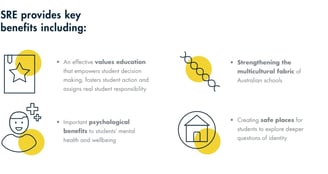Enrolling in SRE
In NSW public schools, opportunity is provided for students to participate in Special Religious Education (SRE), where authorised teachers of approved providers are available. Ben is authorised through the Baptist Association of NSW & ACT as an approved provider.
Enrolling in SRE is as simple as filling out the ‘SRE Participation Letter’ at your local High School, signaling your intent to have your child opt into the SRE program. These notes are provided at the time of enrolment by the school. If you didn't receive a participation letter or would like your child to be part of the SRE program you can requested a ‘SRE Participation Letter’ by contacting the High School office.
You can opt into SRE at any point throughout the year. To do this please notify the school in writing a letter/email (school email address is below) to indicate your desire for your child to participate in SRE.
Research has demonstrated that religious education is valuable as part of the wider educational development of students. The benefits of Special Religious Education are:
it helps contribute to successful students, as they nurture spiritual wellbeing.
SRE helps broaden the student’s educational experience.
Students get an understanding of the basic tenets of the Christian faith, addressing big questions about God, Faith, and the Bible.
Students learn they are valuable and loved.
Students develop personal values through a biblical worldview.
Students gain an understanding of how the Christian Faith has shaped western culture.
To enrol in SRE at Whitebridge High School, use the email links below to contact the school directly. Place ‘Enrolling in SRE’ as the subject heading of your email:


" SRE is a strength of our public education system, it benefits student mental health and well-being, provides safe places for students to explore faith and belief and strengthens multiculturalism."
The Honourable Sarah Mitchell, MLC, New South Wales Minister for Education and Early Childhood Learning.




'Study of Special Religious Education and its value to contemporary society'
Zehavit Gross and Suzanne D. Rutland
